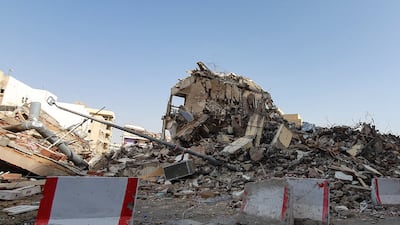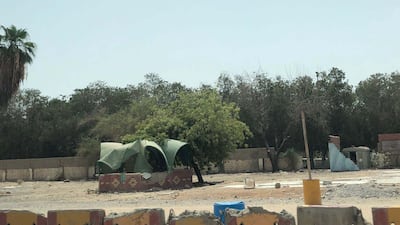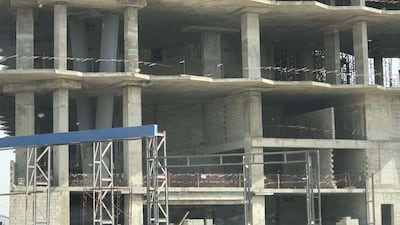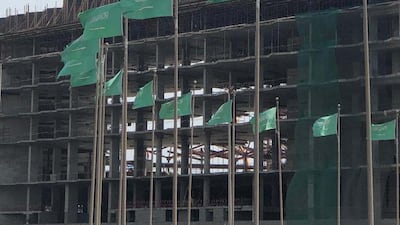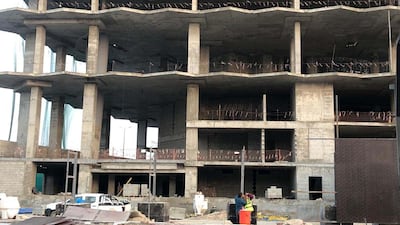“I've lived here almost my whole life,” says Haifa, a Sudanese woman in Saudi Arabia's Red Sea city of Jeddah, pointing to a torn-down building surrounded by rubble, south of the city.
Jeddah, along with several other cities, is undergoing enormous changes. One of the major projects is to redevelop the city after removing old and uninhabited buildings and replacing them with modern housing.
Municipal authorities say the renovation work in 64 districts across Jeddah is due to end by mid-November this year. About 20 districts will be developed without demolishment work.
Saleh Al Turki, the newly appointed mayor of Makkah, previously mayor of Jeddah, says conditions in these areas are unfavourable and there is inadequate security.
“There are no blueprints, their infrastructure is nearly non-existent, they are dens of crime,” he says of the areas being demolished.
The municipality on Monday announced that 28 run-down areas and other neighbourhoods have so far been razed as part of the Jeddah redevelopment plan.
Muhammad Al Baqami, spokesman for the Jeddah mayoralty, spoke about the progress made.
“Out of the total 32 neighbourhoods, four are remaining and they will be removed within the scheduled timeline,” says Mr Al Baqami.

“Removal of slums in Jeddah will be completed by the end of this year and all construction waste will be recycled,” he says.
The Ministry of Municipal, Rural Affairs and Housing has said approximately 82.1 per cent of the country’s population resides in urban areas.
Haifa came to the kingdom more than two decades ago, soon after she got married, and worked in different homes as a helper, to earn a living.
“My whole family, including my five children and my relatives, lived in these areas,” she says.
Haifa says she currently lives with her children in a shared apartment, while the rest of her family have been returned to Sudan.
Modernising Jeddah
But while some people worry about the impact of the sweeping changes, many believe the system is fair and progress is the only way forward.
“This is great and extremely important — how can you preserve our heritage without looking after it?” says Aziz Muhammad, a photographer in Jeddah. “You can only preserve something in good condition, when you look after it and that's what the government wants, to build sustainable infrastructure and one that is easy to maintain”.

Uzma Khan, a Pakistani living in Aziziyah district in Jeddah, says the conditions in some of these buildings makes them impossible to live in.
“They are in dire condition and look horrible,” she says.
“I think it was time someone paid attention and said ‘let’s make it better’, finally.
“It’s a shambles. Yes, it’s inconvenient for people to move out or find new homes but the authorities want to make this a better place for them in the end.”
Winds of Change
In one of Jeddah's oldest gold souqs, called “Kandara”, shopkeepers say the city is now “changing by the day”.
Thousands of people used to live in these old streets. They would be buzzing with Arab, African and Asian children, traffic and noise. But not any more. Abdullah, a shopkeeper in Kandara, looks at the quiet and empty street around his store.
“We are still here,” he says with a smile. “Even when this place will have tall towers and become like Dubai.”
Authorities have allotted houses for 5,589 Saudi families whose homes were demolished in the run-down districts of Jeddah, Prince Khalid Al Faisal, governor of Makkah said earlier this month.
Directives were further issued to speed up the disbursement of compensation to citizens that began this month.
A spokesman of the Jeddah Slums Committee tells The National, “everything is on track and we are going according to schedule”.
He says work on more than 20 neighbourhoods has been completed while several remain “until the end of the year”.
More than 200 beneficiaries were given housing and services, such as payment of rent, luggage transfer, and distribution of meals, medicines, and other essential goods.
Jeddah governorate’s Undeveloped Neighbourhoods Committee in June began paying 1 billion Saudi Riyals ($267 million) to landowners whose properties were demolished as part of the restoration project.
The infrastructure developed under the Idle Land Programme will help increase home ownership among Saudi Arabia’s citizens to 70 per cent by 2030.

“I am buying property and think it’s a great chance for young Saudi entrepreneurs and investors to buy now as an investment for long-term profits,” says Hussein Abdullah, a businessman in Jeddah.
Prince Khalid said dilapidated areas would be developed to reflect the aspirations of the leadership and take Jeddah to the level of developed countries’ modern cities.
Many residents feel the changes are happening too fast, but are necessary to make a difference to the standard of living in a growing economy.

Families that are part of the social security schemes and residents who have title deeds of their properties are given housing until they receive full financial compensation.
Residents are asked to apply for compensation through an official website (https://services.jeddah.gov.sa/) to help streamline the process. The settlement will be adjusted according to the timeline and completion of the project, including the inventory and evaluation of the demolished properties, and verifying title deeds, along with other required documents.
For citizens who are neither beneficiaries of social security schemes nor deed holders, the government decided that the concerned authorities will investigate their cases before providing housing.
Crown Prince Mohammed bin Salman in December announced the $20 billion Jeddah Central project that will revamp about 5.7 million square metres of the city’s waterfront area. The project will include several green spaces, an opera house, an oceanarium and a sport stadium, along with more than 17,000 residential units and 2,700 hotel rooms.
Jeddah’s Al Balad (old town) hosted the Red Sea Film Festival last year.
Shami Asad, a resident of Al Balad, says “it was mind-blowing”, to have international stars line up in one of the oldest parts of the city.
“It gives Al Balad and Jeddah so much power and recognition — like it deserves. It is great to see the government take care of these areas and showcase them to the world.”
